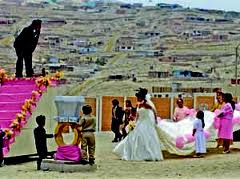 Fausta, living in the poor outskirts of Peru’s capital Lima, was raised hearing her mother sing almost every day about her experience of being raped. Her mother was descended from the Quechua people from the Incan Empire living in the Andes Mountains that experienced a violent civil war in the 80s. She took refuge in Lima after her husband was slaughtered and after her own brutal rape. Fausta seems to be around 20 years old thus her mother is likely in her 40s, but she already looks very old. This song having evoked a fear of being raped, Fausta puts a potato in her body to defend herself from being raped. The potato damages her body, but Fausta stubbornly refuses to take it out.
Fausta, living in the poor outskirts of Peru’s capital Lima, was raised hearing her mother sing almost every day about her experience of being raped. Her mother was descended from the Quechua people from the Incan Empire living in the Andes Mountains that experienced a violent civil war in the 80s. She took refuge in Lima after her husband was slaughtered and after her own brutal rape. Fausta seems to be around 20 years old thus her mother is likely in her 40s, but she already looks very old. This song having evoked a fear of being raped, Fausta puts a potato in her body to defend herself from being raped. The potato damages her body, but Fausta stubbornly refuses to take it out.
 One day her mother dies. In order to make money to pay to have her mother’s dead body buried in her hometown in the Andes Mountains, Fausta starts working as a maid at a woman’s house in the highest class neighborhood adjacent to the poor region she lives in. The mistress listens to Fausta sing and gives Fausta one pearl for each sad song she improvises. The mistress is a world-renowned pianist and she composes a piano sonata based on the songs Fausta sings. After performing this piece of music and receiving high praise, she fires Fausta. Fausta possesses an abnormal fear of men and rejects the trustworthy gardener who likes her, but finally she undergoes the operation to have the potato removed from her body. This movie ends by depicting Fausta burying her mother’s dead body in the beautiful Andes Mountains and, at the very end, her response (probably) to the gardener’s affections.
One day her mother dies. In order to make money to pay to have her mother’s dead body buried in her hometown in the Andes Mountains, Fausta starts working as a maid at a woman’s house in the highest class neighborhood adjacent to the poor region she lives in. The mistress listens to Fausta sing and gives Fausta one pearl for each sad song she improvises. The mistress is a world-renowned pianist and she composes a piano sonata based on the songs Fausta sings. After performing this piece of music and receiving high praise, she fires Fausta. Fausta possesses an abnormal fear of men and rejects the trustworthy gardener who likes her, but finally she undergoes the operation to have the potato removed from her body. This movie ends by depicting Fausta burying her mother’s dead body in the beautiful Andes Mountains and, at the very end, her response (probably) to the gardener’s affections.
This movie has the distant background of the civil conflict in Peru beginning in the 1980s between the Maoist group Sendero Luminoso (“Shining Path”) and the government troops trying to suppress them. The Sendero Luminoso had their power centered around the Andes Mountains area. During the conflict between the Sendero Luminoso and government troops, many villagers were murdered and raped. However, this movie is not a political drama to depict these terrible scenes. No violence appears in this movie. The audience may think that the mother was retaliated against by government troops for the crime of sheltering a guerilla of the Sendero Luminoso, but also the Sendero Luminoso is called the “South American Pol Pot” in contemporary history for exerting utmost cruelty; the movie does not speak at all of which side raped the mother.
 The movie’s cinematography is extremely beautiful, but for some reason it leaves a lasting pain in your heart. Since real terror is symbolized by the potato in her body instead of visible violence, this sadness is not visible but is felt. Also, it could be said that the growing process of this young maiden is an allegory. Her mother’s lullaby about rape strongly influenced Fausta—she couldn’t laugh, and she hid behind walls when she walked the streets—until she became an adult. She bled from her nose when she was afraid, and could not love someone out of fear. However, she finally makes up her mind to live by overcoming her mother’s curse.
The movie’s cinematography is extremely beautiful, but for some reason it leaves a lasting pain in your heart. Since real terror is symbolized by the potato in her body instead of visible violence, this sadness is not visible but is felt. Also, it could be said that the growing process of this young maiden is an allegory. Her mother’s lullaby about rape strongly influenced Fausta—she couldn’t laugh, and she hid behind walls when she walked the streets—until she became an adult. She bled from her nose when she was afraid, and could not love someone out of fear. However, she finally makes up her mind to live by overcoming her mother’s curse.
When this movie was one of five finalists to be nominated for the Academy Award for Best Foreign Language Film, the Peru government was ecstatic; Peru expected an increase in tourism revenues after people all around the world watched this movie. The governments of each country select one movie to be considered for the Academy Award for Best Foreign Language Film. This movie depicts dark times in Peru, but I think the government approved this movie because these times were already in the past for Peru’s government, the government succeeded in achieving peace, and this movie shows that the people of Peru are happy today.
It was President Alberto Fujimori, a Japanese Peruvian, who finally ended the civil conflict that exhausted the Peru nation. At that time, the Sendero Luminoso occupied most of Peru, seized the Pan-American Highway and major roads, and surrounded Lima; there was a feeling that a revolution by the Sendero Luminoso was approaching soon. The citizens disappointed by left-wing President Alan Garcia Pérez were pressed to make a serious decision for Peru’s future in the presidential election in 1990. Mario Vargas Llosa who served as chairman of PEN International and won numerous international literary prizes was thought to be the favorite for president, but when the voting was over, dark horse Fujimori was elected. He won the election for various reasons; Japanese Peruvian Fujimori was racially neutral in the antagonism between the Spanish ruling class and the poor indigenous Peruvians, and he also received support from the rich Spanish Peruvians. Although Mario Vargas Llosa was left-wing, he was of Spanish descent so he did not receive full support from the indigenous Peruvians; also contributing to his defeat, his socialist economic policy was not considered realistic.
Mario Vargas Llosa later won the Nobel Prize in Literature. The director of this movie, Claudia Llosa, is the niece of Mario Vargas Llosa.
This movie was a big hit in the country of Peru and received international praise after winning the Golden Bear Award at the Berlin International Film Festival and being nominated for an Academy Award. However, there is criticism for this movie domestically. Fausta and her uncle’s family live in a slum, the slums in the outskirts of Lima called pueblo jóven (“young town”). Adjacent to this is the highest class housing district, where the affluent Spanish pianist lives. With an upcoming concert, the musician who had fallen into a slump performs Fausta’s songs that she heard in exchange for pearls as her own musical pieces, and then fires Fausta. This episode is reminiscent of the former ruler/ruled social structure. Director Claudia Llosa is Spanish and she did her higher education in Spain and America. That is to say, she is the status of the pianist in the movie, but she attempted to make the movie from the viewpoint of an indigenous Peruvian. However, no matter how good-intentioned and artistic the movie was, there is something in the movie that is not completely accepted by Peruvian hearts that consider themselves indigenous. This criticism may stem from the hatred remaining in indigenous advocates toward the elite Caucasian Peruvians supposedly in support of fraternity for all, like her uncle Mario Vargas Lllosa. This criticism reminds us that the nationalism of the Quechua people—which can be understood only by Quecha people who once built the Incan Empire—is still alive.
